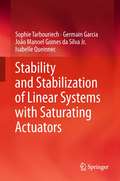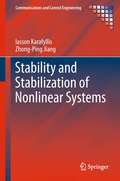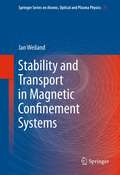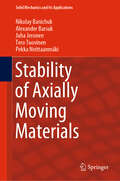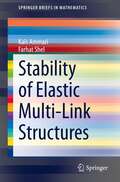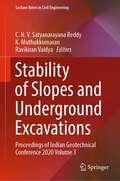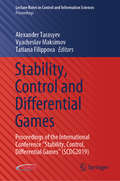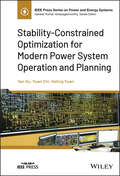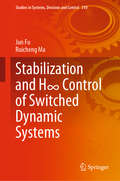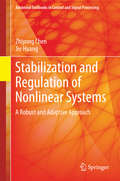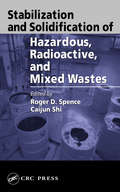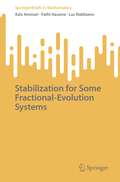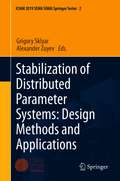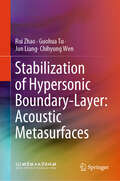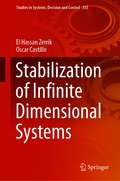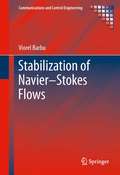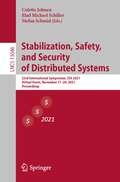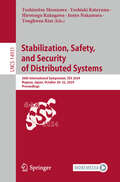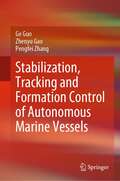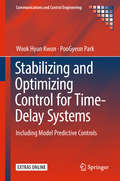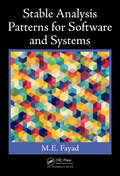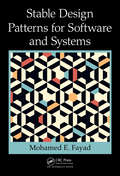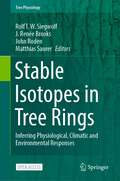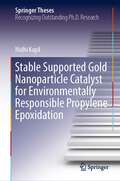- Table View
- List View
Stability and Stabilization of Linear Systems with Saturating Actuators
by João Manoel Gomes Da Silva Jr. Germain Garcia Isabelle Queinnec Sophie TarbouriechThis monograph details basic concepts and tools fundamental for the analysis and synthesis of linear systems subject to actuator saturation and developments in recent research. The authors use a state-space approach and focus on stability analysis and the synthesis of stabilizing control laws in both local and global contexts. Different methods of modeling the saturation and behavior of the nonlinear closed-loop system are given special attention. Various kinds of Lyapunov functions are considered to present different stability conditions. Results arising from uncertain systems and treating performance in the presence of saturation are given. The text proposes methods and algorithms, based on the use of linear programming and linear matrix inequalities, for computing estimates of the basin of attraction and for designing control systems accounting for the control bounds and the possibility of saturation. They can be easily implemented with mathematical software packages.
Stability and Stabilization of Nonlinear Systems
by Zhong-Ping Jiang Iasson KarafyllisRecently, the subject of nonlinear control systems analysis has grown rapidly and this book provides a simple and self-contained presentation of their stability and feedback stabilization which enables the reader to learn and understand major techniques used in mathematical control theory. In particular: the important techniques of proving global stability properties are presented closely linked with corresponding methods of nonlinear feedback stabilization; a general framework of methods for proving stability is given, thus allowing the study of a wide class of nonlinear systems, including finite-dimensional systems described by ordinary differential equations, discrete-time systems, systems with delays and sampled-data systems; approaches to the proof of classical global stability properties are extended to non-classical global stability properties such as non-uniform-in-time stability and input-to-output stability; and new tools for stability analysis and control design of a wide class of nonlinear systems are introduced. The presentational emphasis of Stability and Stabilization of Nonlinear Systems is theoretical but the theory's importance for concrete control problems is highlighted with a chapter specifically dedicated to applications and with numerous illustrative examples. Researchers working on nonlinear control theory will find this monograph of interest while graduate students of systems and control can also gain much insight and assistance from the methods and proofs detailed in this book.
Stability and Stabilization of Nonlinear Systems
by Zhong-Ping Jiang Iasson KarafyllisRecently, the subject of nonlinear control systems analysis has grown rapidly and this book provides a simple and self-contained presentation of their stability and feedback stabilization which enables the reader to learn and understand major techniques used in mathematical control theory. In particular: the important techniques of proving global stability properties are presented closely linked with corresponding methods of nonlinear feedback stabilization; a general framework of methods for proving stability is given, thus allowing the study of a wide class of nonlinear systems, including finite-dimensional systems described by ordinary differential equations, discrete-time systems, systems with delays and sampled-data systems; approaches to the proof of classical global stability properties are extended to non-classical global stability properties such as non-uniform-in-time stability and input-to-output stability; and new tools for stability analysis and control design of a wide class of nonlinear systems are introduced. The presentational emphasis of Stability and Stabilization of Nonlinear Systems is theoretical but the theory's importance for concrete control problems is highlighted with a chapter specifically dedicated to applications and with numerous illustrative examples. Researchers working on nonlinear control theory will find this monograph of interest while graduate students of systems and control can also gain much insight and assistance from the methods and proofs detailed in this book.
Stability and Transport in Magnetic Confinement Systems
by Jan WeilandStability and Transport in Magnetic Confinement Systems provides an advanced introduction to the fields of stability and transport in tokamaks. It serves as a reference for researchers with its highly-detailed theoretical background, and contains new results in the areas of analytical nonlinear theory of transport using kinetic theory and fluid closure. The use of fluid descriptions for advanced stability and transport problems provide the reader with a better understanding of this topic. In addition, the areas of nonlinear kinetic theory and fluid closure gives the researcher the basic knowledge of a highly relevant area to the present development of transport physics.
Stability of Axially Moving Materials (Solid Mechanics and Its Applications #259)
by Pekka Neittaanmäki Nikolay Banichuk Juha Jeronen Tero Tuovinen Alexander BarsukThis book discusses the stability of axially moving materials, which are encountered in process industry applications such as papermaking. A special emphasis is given to analytical and semianalytical approaches. As preliminaries, we consider a variety of problems across mechanics involving bifurcations, allowing to introduce the techniques in a simplified setting. In the main part of the book, the fundamentals of the theory of axially moving materials are presented in a systematic manner, including both elastic and viscoelastic material models, and the connection between the beam and panel models. The issues that arise in formulating boundary conditions specifically for axially moving materials are discussed. Some problems involving axially moving isotropic and orthotropic elastic plates are analyzed. Analytical free-vibration solutions for axially moving strings with and without damping are derived. A simple model for fluid--structure interaction of an axially moving panel is presented in detail. This book is addressed to researchers, industrial specialists and students in the fields of theoretical and applied mechanics, and of applied and computational mathematics.
Stability of Elastic Multi-Link Structures (SpringerBriefs in Mathematics)
by Kaïs Ammari Farhat ShelThis brief investigates the asymptotic behavior of some PDEs on networks. The structures considered consist of finitely interconnected flexible elements such as strings and beams (or combinations thereof), distributed along a planar network. Such study is motivated by the need for engineers to eliminate vibrations in some dynamical structures consisting of elastic bodies, coupled in the form of chain or graph such as pipelines and bridges. There are other complicated examples in the automotive industry, aircraft and space vehicles, containing rather than strings and beams, plates and shells. These multi-body structures are often complicated, and the mathematical models describing their evolution are quite complex. For the sake of simplicity, this volume considers only 1-d networks.
Stability of Slopes and Underground Excavations: Proceedings of Indian Geotechnical Conference 2020 Volume 3 (Lecture Notes in Civil Engineering #185)
by C. N. V. Satyanarayana Reddy K. Muthukkumaran Ravikiran VaidyaThis book comprises select proceedings of the Indian Geotechnical Conference 2020 (IGC2020) focusing on recent developments in the field of transportation geotechnics, scour and erosion, offshore geotechnics, and environmental geotechnology. The contents are useful to academicians, researchers, practitioners and policymakers to understand and tackle the challenges in an efficient manner and to adopt appropriate sustainable geotechnical engineering solutions.
Stability, Control and Differential Games: Proceedings of the International Conference “Stability, Control, Differential Games” (SCDG2019) (Lecture Notes in Control and Information Sciences - Proceedings)
by Alexander Tarasyev Vyacheslav Maksimov Tatiana FilippovaThis book presents the proceedings of the International Conference “Stability, Control, Differential Games” (SCDG2019, September 16 – 20, 2019, Yekaterinburg, Russia), organized by the Krasovskii Institute of Mathematics and Mechanics of the Ural Branch of the Russian Academy of Sciences. Discussing the latest advances in the theory of optimal control, stability theory and differential games, it also demonstrates the application of new techniques and numerical algorithms to solve problems in robotics, mechatronics, power and energy systems, economics and ecology. Further, the book includes fundamental results in control theory, stability theory and differential games presented at the conference, as well as a number of chapters focusing on novel approaches in solving important applied problems in control and optimization. Lastly, it evaluates recent major accomplishments, and forecasts developments in various up-and-coming areas, such as hybrid systems, model predictive control, Hamilton–Jacobi equations and advanced estimation algorithms.
Stability-Constrained Optimization for Modern Power System Operation and Planning (IEEE Press Series on Power and Energy Systems)
by Yan Xu Yuan Chi Heling YuanStability-Constrained Optimization for Modern Power System Operation and Planning Comprehensive treatment of an aspect of stability constrained operations and planning, including the latest research and engineering practices Stability-Constrained Optimization for Modern Power System Operation and Planning focuses on the subject of power system stability. Unlike other books in this field, which focus mainly on the dynamic modeling, stability analysis, and controller design for power systems, this book is instead dedicated to stability-constrained optimization methodologies for power system stability enhancement, including transient stability-constrained power system dispatch and operational control, and voltage stability-constrained dynamic VAR Resources planning in the power grid. Authored by experts with established track records in both research and industry, Stability-Constrained Optimization for Modern Power System Operation and Planning covers three parts: Overview of power system stability, including definition, classification, phenomenon, mathematical models and analysis tools for stability assessment, as well as a review of recent large-scale blackouts in the world Transient stability-constrained optimal power flow (TSC-OPF) and transient stability constrained-unit commitment (TSC-UC) for power system dispatch and operational control, including a series of optimization model formulations, transient stability constraint construction and extraction methods, and efficient solution approaches Optimal planning of dynamic VAR Resources (such as STATCOM and SVC) in power system for voltage stability enhancement, including a set of voltage stability indices, candidate bus selection methods, multi-objective optimization model formulations, and high-quality solution approaches Stability-Constrained Optimization for Modern Power System Operation and Planning provides the latest research findings to scholars, researchers, and postgraduate students who are seeking optimization methodologies for power system stability enhancement, while also offering key practical methods to power system operators, planners, and optimization algorithm developers in the power industry.
Stabilization and H∞ Control of Switched Dynamic Systems (Studies in Systems, Decision and Control #310)
by Jun Fu Ruicheng MaThis book presents several novel constructive methodologies for global stabilization and H-infinity control in switched dynamic systems by using the systems’ structure information. The main features of these new approaches are twofold: i) Novel Lyapunov functions are constructed and new switching strategies are designed to guarantee global finite-time stabilization of the closed-loop switched dynamic systems,while ii) without posing any internal stability requirements on subsystems, the standard H-infinity control problem of the switched dynamic systems is solved by means of dwell-time switching techniques. Systematically presenting constructive methods for analyzing and synthesizing switched systems, the content is of great significance to theoretical research and practical applications involving switched systems alike. The book provides a unified framework for stability analysis, stabilization and H-infinity control of switched systems, making it a valuable resource for researchers and graduate students who want to learn about the state of the art in the analysis and synthesis of switched systems, as well as recent advances in switched linear systems. In addition, it offers a wealth of cutting-edge constructive methods and algorithm designs for researchers who work with switched dynamic systems and graduate students of control theory and control engineering.
Stabilization and Regulation of Nonlinear: A Robust and Adaptive Approach
by Zhiyong Chen Jie HuangThe core of this textbook is a systematic and self-contained treatment of the nonlinear stabilization and output regulation problems. Its coverage embraces both fundamental concepts and advanced research outcomes and includes many numerical and practical examples. Several classes of important uncertain nonlinear systems are discussed. The state-of-the art solution presented uses robust and adaptive control design ideas in an integrated approach which demonstrates connections between global stabilization and global output regulation allowing both to be treated as stabilization problems. Stabilization and Regulation of Nonlinear Systems takes advantage of rich new results to give students up-to-date instruction in the central design problems of nonlinear control, problems which are a driving force behind the furtherance of modern control theory and its application. The diversity of systems in which stabilization and output regulation become significant concerns in the mathematical formulation of practical control solutions--whether in disturbance rejection in flying vehicles or synchronization of Lorenz systems with harmonic systems--makes the text relevant to readers from a wide variety of backgrounds. Many exercises are provided to facilitate study and solutions are freely available to instructors via a download from springerextras. com. Striking a balance between rigorous mathematical treatment and engineering practicality, Stabilization and Regulation of Nonlinear Systems is an ideal text for graduate students from many engineering and applied-mathematical disciplines seeking a contemporary course in nonlinear control. Practitioners and academic theorists will also find this book a useful reference on recent thinking in this field.
Stabilization and Solidification of Hazardous, Radioactive, and Mixed Wastes
by Caijun Shi Roger D. SpenceThe development of stabilization and solidification techniques in the field of waste treatment reflects the efforts to better protect human health and the environment with modern advances in materials and technology. Stabilization and Solidification of Hazardous, Radioactive, and Mixed Wastes provides comprehensive information including case studie
Stabilization for Some Fractional-Evolution Systems (SpringerBriefs in Mathematics)
by Kaïs Ammari Luc Robbiano Fathi HassineThis brief provides unified methods for the stabilization of some fractional evolution systems, nicely complementing existing literature on fractional calculus. The volume is divided into three chapters, the first of which considers the stabilization for some abstract evolution equations with a fractional damping, the second of which validates the abstract results of chapter 1 on concrete examples, and the third of which studies the stabilization of fractional evolution systems with memory.
Stabilization of Distributed Parameter Systems: Design Methods and Applications (SEMA SIMAI Springer Series #2)
by Grigory Sklyar Alexander ZuyevThis book presents recent results and envisages new solutions of the stabilization problem for infinite-dimensional control systems. Its content is based on the extended versions of presentations at the Thematic Minisymposium “Stabilization of Distributed Parameter Systems: Design Methods and Applications” at ICIAM 2019, held in Valencia from 15 to 19 July 2019. This volume aims at bringing together contributions on stabilizing control design for different classes of dynamical systems described by partial differential equations, functional-differential equations, delay equations, and dynamical systems in abstract spaces. This includes new results in the theory of nonlinear semigroups, port-Hamiltonian systems, turnpike phenomenon, and further developments of Lyapunov's direct method. The scope of the book also covers applications of these methods to mathematical models in continuum mechanics and chemical engineering. It is addressed to readers interested in control theory, differential equations, and dynamical systems.
Stabilization of Hypersonic Boundary-Layer: Acoustic Metasurfaces
by Jun Liang Rui Zhao Guohua Tu Chihyung WenThis book explores the mechanisms and applications of acoustic metasurfaces in the hypersonic transition control area. It begins with an introduction of the concepts of acoustic metasurface and hypersonic boundary-layer stabilization, which also provides a full scene of the research progress in the past two decades. This book then discusses the modeling methods of various acoustic metasurfaces, including the regular and irregular ones, and describes how the models are to be used in theoretical analysis and numerical calculations. The design strategies and optimization methods are presented to promote the applications in the engineering community. The possible stabilization mechanisms are explored, and the proposed analysis methods are used to clarify other flow instabilities. This book delivers valuable insight for aerospace engineers, postgraduate students, and researchers.
Stabilization of Infinite Dimensional Systems (Studies in Systems, Decision and Control #355)
by Oscar Castillo El Hassan ZerrikThis book deals with the stabilization issue of infinite dimensional dynamical systems both at the theoretical and applications levels. Systems theory is a branch of applied mathematics, which is interdisciplinary and develops activities in fundamental research which are at the frontier of mathematics, automation and engineering sciences. It is everywhere, innumerable and daily, and moreover is there something which is not system: it is present in medicine, commerce, economy, psychology, biological sciences, finance, architecture (construction of towers, bridges, etc.), weather forecast, robotics, automobile, aeronautics, localization systems and so on. These are the few fields of application that are useful and even essential to our society. It is a question of studying the behavior of systems and acting on their evolution. Among the most important notions in system theory, which has attracted the most attention, is stability. The existing literature on systems stability is quite important, but disparate, and the purpose of this book is to bring together in one document the essential results on the stability of infinite dimensional dynamical systems. In addition, as such systems evolve in time and space, explorations and research on their stability have been mainly focused on the whole domain in which the system evolved. The authors have strongly felt that, in this sense, important considerations are missing: those which consist in considering that the system of interest may be unstable on the whole domain, but stable in a certain region of the whole domain. This is the case in many applications ranging from engineering sciences to living science. For this reason, the authors have dedicated this book to extension of classical results on stability to the regional case. This book considers a very important issue, which is that it should be accessible to mathematicians and to graduate engineering with a minimal background in functional analysis. Moreover, for the majority of the students, this would be their only acquaintance with infinite dimensional system. Accordingly, it is organized by following increasing difficulty order. The two first chapters deal with stability and stabilization of infinite dimensional linear systems described by partial differential equations. The following chapters concern original and innovative aspects of stability and stabilization of certain classes of systems motivated by real applications, that is to say bilinear and semi-linear systems. The stability of these systems has been considered from a global and regional point of view. A particular aspect concerning the stability of the gradient has also been considered for various classes of systems. This book is aimed at students of doctoral and master’s degrees, engineering students and researchers interested in the stability of infinite dimensional dynamical systems, in various aspects.
Stabilization of Navier–Stokes Flows
by Viorel BarbuStabilization of Navier-Stokes Flows presents recent notable progress in the mathematical theory of stabilization of Newtonian fluid flows. Finite-dimensional feedback controllers are used to stabilize exponentially the equilibrium solutions of Navier-Stokes equations, reducing or eliminating turbulence. Stochastic stabilization and robustness of stabilizable feedback are also discussed. The analysis developed here provides a rigorous pattern for the design of efficient stabilizable feedback controllers to meet the needs of practical problems and the conceptual controllers actually detailed will render the reader's task of application easier still. Stabilization of Navier-Stokes Flows avoids the tedious and technical details often present in mathematical treatments of control and Navier-Stokes equations and will appeal to a sizeable audience of researchers and graduate students interested in the mathematics of flow and turbulence control and in Navier-Stokes equations in particular.
Stabilization, Safety, and Security of Distributed Systems: 23rd International Symposium, SSS 2021, Virtual Event, November 17–20, 2021, Proceedings (Lecture Notes in Computer Science #13046)
by Stefan Schmid Colette Johnen Elad Michael SchillerThis book constitutes the refereed proceedings of the 23rd International Symposium on Stabilization, Safety, and Security of Distributed Systems, SSS 2021, held virtually, in November 2021. The 16 full papers, 10 short and 14 invited papers presented were carefully reviewed and selected from 56 submissions. The papers deal with the design and development of distributed systems with a focus on systems that are able to provide guarantees on their structure, performance, and/or security in the face of an adverse operational environment.
Stabilization, Safety, and Security of Distributed Systems: 26th International Symposium, SSS 2024, Nagoya, Japan, October 20–22, 2024, Proceedings (Lecture Notes in Computer Science #14931)
by Toshimitsu Masuzawa Yoshiaki Katayama Hirotsugu Kakugawa Junya Nakamura Yonghwan KimThis book constitutes the proceedings of the 25th International Symposium on Stabilization, Safety, and Security of Distributed Systems, SSS 2024, held in Nagoya, Japan, during October 20-22, 2024. The 22 full and 4 invited papers as well as 6 short papers included in this book were carefully reviewed and selected from 69 submissions. They deal with the design and development of distributed systems with a focus on systems that are able to provide guarantees on their structure, performance, and/or security in the face of an adverse operational environment. The book also includes one invited talk in full paper length.
Stabilization, Tracking and Formation Control of Autonomous Marine Vessels
by Pengfei Zhang Ge Guo Zhenyu GaoThis book focuses on autonomous marine vessel systems and control approaches. In particular, it mainly contains modeling, analysis and control design methodologies for covert stabilization control, trajectory tracking control, and cooperative formation control of AMVs. The comprehensive and systematic treatment of practical issues in autonomous marine vessel systems is one of the book’s significant features, particularly suited for readers interested in learning control problems in AMV and other related topic areas like mobile robots and vehicles. The book can benefit researchers, engineers, and graduate students in mathematical skills, methodologies, and algorithms needed in the analysis and control design for tracking and stabilization, cooperative control of surface vessels and underwater vehicles. Through the book, readers can have a deeper understanding of such fields.
Stabilizing and Optimizing Control for Time-Delay Systems: Including Model Predictive Controls (Communications and Control Engineering)
by Wook Hyun Kwon PooGyeon ParkStabilizing and Optimizing Control for Time-Delay Systems introduces three important classes of stabilizing controls for time-delay systems: non-optimal (without performance criteria); suboptimal (including guaranteed costs); and optimal controls. Each class is treated in detail and compared in terms of prior control structures. State- and input-delayed systems are considered. The book provides a unified mathematical framework with common notation being used throughout. Receding-horizon, or model predictive, linear quadratic (LQ), linear-quadratic-Gaussian and H∞ controls for time-delay systems are chosen as optimal stabilizing controls. Cost monotonicity is investigated in order to guarantee the asymptotic stability of closed-loop systems operating with such controls. The authors use guaranteed LQ and H∞ controls as representative sub-optimal methods; these are obtained with pre-determined control structures and certain upper bounds of performance criteria. Non-optimal stabilizing controls are obtained with predetermined control structures but with no performance criteria. Recently developed inequalities are exploited to obtain less conservative results. To facilitate computation, the authors use linear matrix inequalities to represent gain matrices for non-optimal and sub-optimal stabilizing controls, and all the initial conditions of coupled differential Riccati equations of optimal stabilizing controls. Numerical examples are provided with MATLAB® codes (downloadable from http://extras.springer.com/) to give readers guidance in working with more difficult optimal and suboptimal controls. Academic researchers studying control of a variety of real processes in chemistry, biology, transportation, digital communication networks and mechanical systems that are subject to time delays will find the results presented in Stabilizing and Optimizing Control for Time-Delay Systems to be helpful in their work. Practitioners working in related sectors of industry will also find this book to be of use in developing real-world control systems for the many time-delayed processes they encounter.
Stable Analysis Patterns for Systems
by Mohamed FayadSoftware analysis patterns play an important role in reducing the overall cost and compressing the time of software project lifecycles. However, building reusable and stable software analysis patterns is still considered a major and delicate challenge. This book proposes a novel concept for building analysis patterns based on software stability and is a modern approach for building stable, highly reusable, and widely applicable analysis patterns. The book also aims to promote better understanding of problem spaces and discusses how to focus requirements analysis accurately. It demonstrates a new approach to discovering and creating stable analysis patterns (SAPs). This book presents a pragmatic approach to understanding problem domains, utilizing SAPs for any field of knowledge, and modeling stable software systems, components, and frameworks. It helps readers attain the basic knowledge that is needed to analyze and extract analysis patterns from any domain of interest. Readers also learn to master methods to document patterns in an effective, easy, and comprehensible manner. Bringing significant contributions to the field of computing, this book is a unique and comprehensive reference manual on SAPs. It provides insight on handling the understanding of problem spaces and supplies methods and processes to analyze user requirements accurately as well as ways to use SAPs in building myriad cost-effective and highly maintainable systems. The book also shows how to link SAPs to the design phase thereby ensuring a smooth transition between analysis and design.
Stable Design Patterns for Software and Systems
by Mohamed FayadAttention to design patterns is unquestionably growing in software engineering because there is a strong belief that using made to measure solutions for solving frequently occurring problems encountered throughout the design phase greatly reduces the total cost and the time of developing software products. Stable Design Patterns for Software and Systems presents a new and fresh approach for creating stable, reusable, and widely applicable design patterns. It deals with the concept of stable design patterns based on software stability as a contemporary approach for building stable and highly reusable and widely applicable design patterns. This book shows that a formation approach to discovering and creating stable design patterns accords with Alexander’s current understanding of architectural patterns. Stable design patterns are a type of knowledge pattern that underline human problem solving methods and appeal to the pattern community. This book examines software design patterns with respect to four central themes: How do we develop a solution for the problem through software stability concepts? This book offers a direct application of using software stability concepts for modeling solutions. How do we achieve software stability over time and design patterns that are effective to use? What are the unique roles of stable design patterns in modeling the accurate solution of the problem at hand and in providing stable and undisputed design for such problems? This book enumerates a complete and domain-less list of stable patterns that are useful for designing and modeling solutions for frequently recurring problems. What is the most efficient way to document the stable design patters to ensure efficient reusability? This book is an extension to the contemporary templates that are used in documenting design patterns. This book gives a pragmatic and a novel approach toward understanding the problem domain and in proposing stable solutions for engineering stable software systems, components, and frameworks.
Stable Isotopes in Tree Rings: Inferring Physiological, Climatic and Environmental Responses (Tree Physiology #8)
by Rolf T. W. Siegwolf J. Renée Brooks John Roden Matthias SaurerThis Open Access volume highlights how tree ring stable isotopes have been used to address a range of environmental issues from paleoclimatology to forest management, and anthropogenic impacts on forest growth. It will further evaluate weaknesses and strengths of isotope applications in tree rings. In contrast to older tree ring studies, which predominantly applied a pure statistical approach this book will focus on physiological mechanisms that influence isotopic signals and reflect environmental impacts. Focusing on connections between physiological responses and drivers of isotope variation will also clarify why environmental impacts are not linearly reflected in isotope ratios and tree ring widths. This volume will be of interest to any researcher and educator who uses tree rings (and other organic matter proxies) to reconstruct paleoclimate as well as to understand contemporary functional processes and anthropogenic influences on native ecosystems. The use of stable isotopes in biogeochemical studies has expanded greatly in recent years, making this volume a valuable resource to a growing and vibrant community of researchers.
Stable Supported Gold Nanoparticle Catalyst for Environmentally Responsible Propylene Epoxidation (Springer Theses)
by Nidhi KapilThis book describes a detailed multi-scale approach integrating nano- (active site), meso- (porous catalyst architecture) and macroscale (reactor) efforts, to address the challenges of producing a better epoxidation catalyst. It contains an in-depth study of the design and synthesis of gold nanoparticles and their application as a catalyst for direct gas phase propylene epoxidation. “Direct” means using only hydrogen and oxygen in one step, which is key for sustainable manufacturing, as opposed to commercialised, more complex production routes requiring multiple steps, or integration with another chemical plant. The insights gained can be used for rational design for stable and selective catalysts for other reactions. It also details the step-by-step process to build an epoxidation reactor system with a focus on safety aspects, which can be used as a guidebook for undergraduate and graduate students in chemical engineering. Beyond heterogeneous catalysis, the new, easily accomplished methodology for synthesising atomically precise nanoparticles is shown to be relevant to electrocatalysis and to healthcare applications, such as anti-microbial surfaces. This book will be of interest to researchers, engineers and experts in the related areas of chemical engineering, chemistry, material science and electrochemistry.
